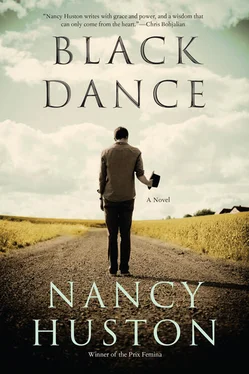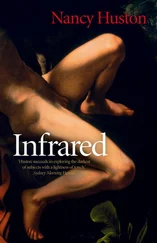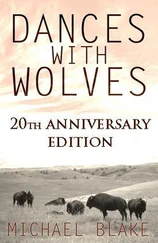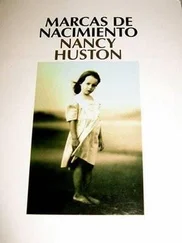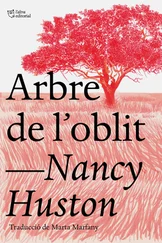A hearse parked in front of the house. Taking his little sister in his arms to comfort her, Norbert himself bursts into sobs. Jan helps Milo pack. Hugs him long and hard. Stacks his luggage in the trunk of a strange car. Sitting up straight and stiff in the backseat, Milo doesn’t respond when the Manderses, gathered in the driveway, wave him good-bye.
He’s furious with Sara for dying. But it’s taught him an important lesson — people can’t belong to each other. Never again will he wholly entrust himself to anyone.
CLOSETS. BROOMS. BELTS. Blows raining down on the child’s head. Shouts. Voices calling his name, “ Milo. . Milo. . Milo. . Where is that boy? Milo. . Milo. . Milo. . Where are you ? I’ll teach you to hide when it’s time to go to school!” Women’s legs banging up around him. Women’s arms thrashing out at him. He’s rolled up in a ball, not crying, not sobbing. His body limp and passive, his mind a blank.
Sometimes, from the dark and secret heart of the blackout, images well up (perhaps use animation here?). A cat without a smile. . a smile without a cat. . Tinker Bell touching something with her magic wand and turning it into something else. . John, Michael and Wendy Darling soaring through the air. . I can fly, I can fly, I can fly! . . Canadian geese screaming as they cross the sky. . Legs without bodies, bodies without legs. . Captain Hook screaming as the crocodile bites off his leg. . Long John Silver also losing a leg. . both pirates limping about on wooden legs. . wooden arms, wooden noses. . Pinocchio’s nose lengthening with every lie. . Alice growing so tall she fills the whole room, her head scrunched up against the ceiling. . then shrinking swiftly until she can drown in a bottle of ink. . We dive into the ink bottle with her.
BLACKOUT.
• • • • •
Neil, 1916
A BUCOLIC SHOT: the front steps of the Kerrigan house in Dublin’s genteel suburbs, early on a lovely April morning. Briefcase in hand, Neil plants a perfunctory kiss on his mother’s cheek. The way they embrace indicates that the balance of power in the household has shifted over the past two years. Mrs. Kerrigan now clearly respects her son, admires him, even. And he, having matured, can contemplate her fears and foibles with something approaching benevolence. As he turns to go, she protests mildly.
“I can’t understand what work there is to be done on a holiday! Surely none of your colleagues will be in the office today.”
“I’ve told you before, Mother. A lawyer’s work, like a woman’s, is never done. I always have numerous cases to prepare, and since I’m the youngest partner in the firm I need to be sure that every file is watertight. What happened on Easter Monday, anyway? Was Jesus so exhausted by the Resurrection that he needed a day off?”
“Neil!”
“Joking, Mother. Joking.”
CUT to Neil meeting up with his cousin Thom (also carrying a briefcase) on the docks at Victoria Quay. Fast camera work translates their excitement. Ducking into an abandoned warehouse next to Saint James’s Gate Brewery, they swiftly exchange their suits and ties for Volunteer garb. Thom assembles a rifle, Neil pockets a revolver and they join other young Sinn Féiners converging in combat gear on the Sackville Street General Post Office. Among them are a surprising number of women. Close-up on beautiful Countess Constance Markiewicz, her arms crossed, her features calm and determined.
Padraic Pearse and James Connolly begin to harangue the rebels.
“Again our boys are dying in droves,” Pearse thunders. “Right at the present moment, a quarter of a million Irishmen are risking their lives for the sake of the Union Jack. And why do they sign up? We all know the answer: because they’re hungry!”
“The submarine Aud was due to land at Tralee on Good Friday,” Connolly goes on, “bringing us arms and ammunition from Europe. Well, the Brits scuttled it! All our precious weapons are at the bottom of the sea! Men, the time is ripe, we must seize the day! Wrench our city of Dublin and our land of Eire back from the hands of the enemy!”
Thom is ready. Proud. Bursting with impatience to prove himself. As for Neil, he’s scared. Never has he known hunger, misery, or loss; he hasn’t the body for courageous revolt. Gradually, the voice in his head effaces the loud voices of the rebel leaders.
Though the rhetoric repels me, though I regret that we should need to appeal to the masses through their guts instead of their brains, though I wish we could kick the Brits out without clinging like Padraic Pearse to ridiculous propaganda about the Celts, or like John MacBride to reactionary Catholicism, or like James Connolly to dogmatic Marxist theory — I’m willing to do battle on the rebels’ side. But in my briefcase, in that briefcase now stashed away in the abandoned brewery, is a weapon far more powerful than the gun in my pocket: the manuscript of my first book of poems. Well, prose poems, actually. A revolutionary form — a joyous mixture of English and Gaelic which, by its accurate reflection of our mongrel history, will shock all. The new Ireland will need new writers, and I shall be first among them. As soon as I find a publisher, my words will set fire to my countrymen’s hearts.
Maps are being perused, lists of names handed out. Of the sixteen thousand rebels nominally available in Dublin, only a thousand have shown up.
What happened to the others? our hero wonders. Are they cowards? Or is their reasoning more logical than ours?. .
SUBJECTIVE CAMERA: FLASH images of Neil’s perceptions over the ensuing days and nights. The tricolor, then the green flag with its golden harp are run up onto the roof of the General Post Office and the Volunteers burst into cheers. Pearse, his voice shaking with emotion, reads out the Proclamation of the Irish Republic. Hailed and heckled, jostled and shoved by overexcited young men, passersby respond with dismay and anger. The gates of Trinity College swing to, clang shut, are locked.
Neil’s inner voice: This is what I must write about. Scrap those Anglo-Gaelic poems and write the great novel of the Easter Rising in Dublin. Find language, the rhythm of words, that will plunge the reader into the state we’re in right now — make him feel the erratic beating of our hearts, Ta, ta-da DA, ta, ta-da DA. . the thrill of fear in our balls, the simultaneous tension and suppleness of our muscles. Never have we been more alive than we are now, so close to death.
The next day, as they take up their assigned post at the entrance to Saint Stephen’s Green, Neil and Thom speak together in whispers.
“The Brits will have a hard time finding men to send over today, Neil.” “Why’s that?” “Krauts just made a zeppelin raid on East Anglia.” “I see. . Quite the coincidence, hey?” “Problem with that, Neil?” “Don’t know how to fit it into my novel.” “Good novels should be full of contradictions, shouldn’t they?”
Hearing a cascade of bullet reports from close by, they drop to the ground. Just then, who should come strolling down Grafton Street in their direction, clad in civilian dress, nose in the air, but Major John MacBride? He brings up short upon reaching the entrance to Saint Stephen’s Green.
“What the hell are you young’uns doing on the ground?”
“We’re taking back our country, sir,” explains Thom, hastily getting to his feet and dusting off his pants.
“Yes?”
Glancing around, the major gathers that something is amiss. The cousins bring him up to date in a few low-spoken words.
“How is it I was not kept informed of these plans?”
“Ah. . well, Major MacBride, sir, your being so famous an enemy of the British, it was feared you might be under surveillance. We felt we couldn’t take the risk.”
Читать дальше
